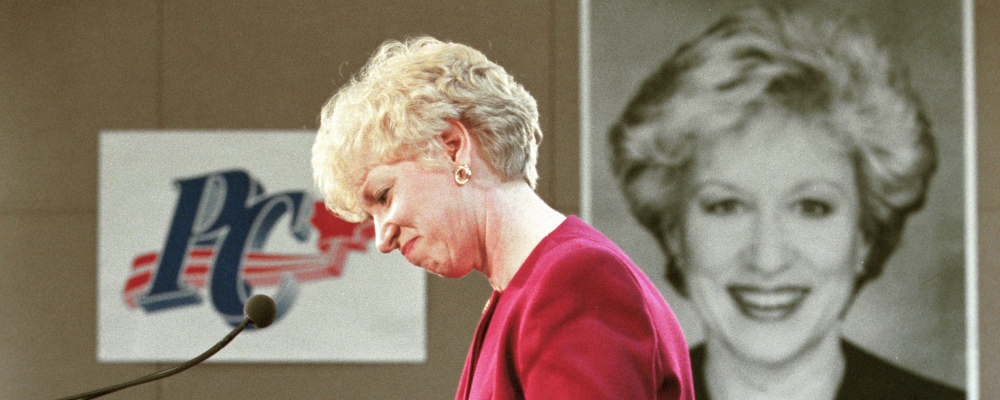Canada’s political and media classes owe former Prime Minister Kim Campbell an apology.
She’s been ridiculed and pilloried for nearly 30 years for saying that “an election is no time to discuss serious issues.” Yet, for all of the Laurentian laments about her so-called “gaffe,” Campbell’s real blunder was merely to put into words what the political parties and mainstream media have since put into practice.
One cannot help but think that the enduring legacy of her comments — which now date back nine federal elections ago — is itself a bit of tell: they “doth protest too much” precisely because they feel self-conscious about their own roles in perpetuating an underwhelming level of policy debate in the context of Canada’s recent election campaigns.
Start with political parties. As Robert Asselin observed in a recent article for The Hub, the parties are increasingly vehicles for data- and focus group-driven policymaking that aims to motivate highly-specified segments of the voting population. This type of micro-targeting has become more and more evident in recent election cycles. It’s how we end up with Conservative tax credits for hockey moms and Liberal tax credits for public school teachers.
The goal isn’t to galvanize a wide cross-section of the population with a big, inclusive, and future-oriented vision of the country. Instead it’s to eke out what Canadian pollster Eric Grenier has come to call “the 6 percent election” — in effect, the overriding priority of our political parties is now to move a small percentage of voters in a small number of ridings that can make up the difference between an overall electoral victory or defeat.
Silicon Valley investor and public intellectual Peter Thiel describes this type of thinking as a probabilistic form of politics. It aims to reduce politics and the political process to a sort of “probabilistic science” in which the complex mix of factors that inform voting behaviour can be boiled down into a data-driven model — all with the narrow goal of just reaching the magic number (which in our system amounts to a slim plurality) to defeat one’s opponents.
According to this prevailing model of politicking, culture and values aren’t powerful sources of human identity; they’re merely potential wedge issues or inputs into a model-based analysis for the purposes of voter identification and mobilization. Policy isn’t part of an ambitious overall agenda to address the country’s short- and long-term challenges; it’s a set of disparate proposals perfectly calibrated to reach swing voters in so-called “target ridings.” And leadership isn’t about inspiring voters with a vision bigger than themselves; it’s a poll-tested message that usually aims to obscure a form of political clientelism.
The media is, of course, no better. As conservative scholar Yuval Levin has written, most journalists in recent years have seemingly given up on the institutionalism of their craft and instead sought to elevate their personal brands on social media platforms. They now offer their real-time opinions on Twitter or Facebook in such a way that it’s virtually impossible to distinguish between their fact-based professional work and their own “hot takes.” They’re no longer reporting the news so much as putting forward their own, typically progressive perspectives on what Canadians ought to know and care about.
If the ultimate goal is a combination of high-profile branding and unconstrained personal expression, it’s no surprise that the top journalistic priority isn’t deep dives into ideas and policies. Journalists may occasionally complain about the lack of meaty policy discussion or the ubiquity of political talking points but one gets the sense that their hearts aren’t really in it. Serious policy reporting won’t generate enough clicks or attract enough followers anyway. Instead, notwithstanding some admirable exceptions, the growing trend is for journalists to virtue signal to small, committed audiences about the latest developments in Canada’s economy and society.
The political parties and mainstream media have thus effectively conspired to shut down debate about what Campbell called “serious issues” and instead increasingly opted to speak to a small echo chamber of reliable partisans within the narrow goalposts of accepted political discourse. The result is the county is left with a sorry state of policy-based debate. Ordinary Canadians who are concerned about their futures and the future of their children are the ultimate losers.
Just think that we’re about to, by all accounts, head into an election campaign as early as this weekend and it’s already shaping up to be underwhelming.
Polling suggests the Canadian public is ready for big ideas.
This just seems like such an obvious missed opportunity. At the precise moment that we ought to be grappling with fundamental questions like the role of government in the economy, Canada’s place in the world, managing the effects of climate change, addressing the economic, fiscal and social fallout from the pandemic, or protecting the future of pluralism in an increasingly polarized society, it seems that instead we’re likely to get more of the same. Although it can be difficult to measure, the so-called “Overton Window” of policy ideas and debate seems narrower in Canada than most peer jurisdictions.
As we’ve argued elsewhere at The Hub, this may misinterpret what voters are actually searching for. There’s reason to think that the political parties and the mainstream media underestimate Canadians. Polling suggests that the Canadian public is ready for big ideas and actually has an unfilled demand for competing visions of the future.
Which brings us to The Hub’s plans for the much-anticipated federal campaign. While we cannot solve for the lack of policy ambition among our political parties or the lack of policy attention paid by the mainstream media on our own, we can contribute in our own small way to elevating the place of public policy in the forthcoming campaign.
We choose, in this sense, not to see these longstanding inadequacies in our public discourse as a cause for a despair but instead as a market opportunity. They represent a chance for The Hub to differentiate itself in Canada’s public policy and media ecosystem. We can, in short, be a platform where “serious ideas” are not only welcomed but prioritized.
That’s why we’re pleased to announce that, whenever the federal election kicks off, we’ll be launching Policy Pulse, a new live blog with real-time updates and analysis on the policy proposals coming from the various political parties each and every day over the course of the campaign.
Policy Pulse won’t concern itself with political distractions about the day-to-day horse race or chase moments of faux outrage during the election campaign. Instead, it will track the parties’ policy commitments each day and draw on a diverse mix of policy experts (including academics, think-tank scholars, and regular Hub contributors) to provide real-time, non-partisan analysis on the implications for individuals and the country in a clear, accessible, and evidence-based way.
Readers will be able to access the Policy Pulse live blog on The Hub’s website (thehub.ca) and via our morning newsletter each day (sign up here). The goal is to be a single, one-stop source of policy news and analysis for political practitioners, public servants, stakeholders, journalists, and ordinary Canadians, and, in so doing, elevate the role of public policy in the campaign.
Kim Campbell probably won’t get the apology she deserves for the punchline that her comments about “serious issues” has become in Canadian politics. But either way, The Hub is determined to do its part to prove that she was — and is — wrong.
Historian Richard Weaver famously said: “ideas have consequences.” If you agree and are searching for election coverage that reflects it, stay tuned for Policy Pulse.
Recommended for You

Ginny Roth: J.D. Vance, Pierre Poilievre, and how they slice their economic pie

David Polansky: As President Biden leaves the race, will the Democratic Party hodgepodge hold?

Peter Menzies: The mainstream media should love Doug Ford, now that he’s subsidizing them

Geoff Russ: A future Conservative government must fight the culture war, not stand idly by








